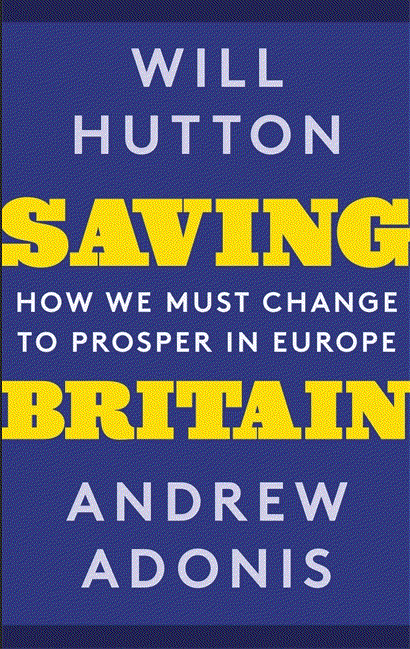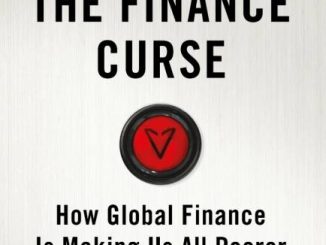 Book review by David Shirreff
Book review by David Shirreff
This is a passionate, well-argued plea for a European Britain, written by two avowedly socialist Remainers. They will not accept the standard disqualifier: that the EU is a collection of unaccountable institutions biased favour of big business and the rich. Bit by bit, during the course of the book, they dismantle that popular slur. What is more, it is not the EU stopping Britain from being a global trading power: “It is our lack of economic strength,” they maintain.
The “hard” Brexiters want to return to an imagined Britain that never existed, they say. On the other hand the authors are not averse to harking back to a Britain that did exist. The two decades between 1931 and 1950 are Britain’s unsung years of economic success: “For a brief period Britain stumbled on the alchemy of successful capitalism.” It was an era in which the officer class, having closely shared with their men the experience of a first or second world war, carried that over into public life and “felt an obligation to deliver the common good”.
Britain’s decline from these higher standards is a tale of woe. Margaret Thatcher, Conservative prime minister from 1979 to 1990, is given a chunk of the blame: for bashing private-sector unions, cutting taxes, launching privatisations and the sale of public housing without replacing it. Most damaging from the Remainer’s point of view was her anti-EU “Bruges speech” in 1988, followed by her attack, from the back benches, on a proposed EU referendum in 1992, which caused euroscepticism to “spread like a plague across her party”.
Popular discontent with the EU has since been fuelled by various factors. Perhaps the biggest mistake, by the Labour government of Tony Blair, was not to apply the permissible grace period of up to seven years on immigration from central Europe in 2004: “The spike [in immigration] proved explosive.” Tory austerity since the start of the financial crisis in 2008 has meant a real decline in wages of 7%. For many voters their “Leave” vote in June 2016 was “a cry of anger and despair”. The majority vote to Leave, and prime minister David Cameron’s immediate resignation, left Nigel Farage, head of the extreme UK Independence Party, as de facto leader of the Conservatives, say Messrs Hutton and Adonis.
The authors will not accept the 2016 vote as final. A strength of democracy, they say, is that “it allows decisions to be revisited.” They provide many arguments in favour of a new people’s vote in order to prevent the country from performing a terrible act of “self-harm”.
Strongest of these is on trade, which has come to the fore as a sticking-point between London and Brussels, not to mention within the Tory party itself. Trying to replace the EU single market and customs union with free-trade agreements, even if successful, would produce meagre results: a boost of 2% in UK trade in the case of Brazil, Russia, India and China, and less than 3% in the case of the United States, Canada, Australia and New Zealand, say the authors. The fact is, the EU is the “deepest free-trade area in the world and its trading standards are rapidly becoming the global standards.” Aren’t we are mad to be leaving it?
Far from favouring corporate giants, the EU is the only trading bloc that has stood up to the likes of Google, Amazon and Facebook: “No single European state could hope to achieve this alone.”
The authors map out a course that Britain could take to be great again – within the EU of course. First, it must encourage stakeholder capitalism, with the promotion of employee ownership trusts, model unions, public-spirited non-executive directors – each company having to define its social purpose. The North must be better connected with itself, and there should be an Industrial Infrastructure Bank. Cities should be encouraged to become “agglomerations” creating their own economic activity. Apprenticeships should be available to all school leavers; education must be improved; voting should be mandatory for all those between 16 and 21. A “Great Charter”, modelled on the Magna Carta of 1215, should turn the UK into a regional federation, with a Senate to replace the House of Lords, peopled by regional representatives and preferably based in York. And another thing: the Great Charter would officially bind the UK to the EU.
The authors make a big deal of the EU’s achievements as a peacemaker. They celebrate the ability of EU nations to “look out for each other in security and defence, to trade, to work, to do science and culture together.” The EU is the “modern solution to reconciling democracy, sovereignty and prosperity.”
Although the book is self-consistent with its stance in favour of the EU, stakeholder capitalism, and the public good, it is rather starry-eyed about who benefits most from the EU regime. It gives little space to the clever lobbyists who have often managed to manipulate Brussels-based mechanisms in favour of big business, big landowners and financial services. Nor does it address the damage arguably done by introducing and continuing to shore up the single currency. That is the other side of the coin.
This book will infuriate Brexiters. It gives Remainers good ammunition to argue their case. And it may raise a tear in the corner of the eye for a Britain which was once less divided and had a stronger sense of direction.
Saving Britain, by Will Hutton and Andrew Adonis
Published by Abacus
ISBN: 978-1408711224




Be the first to comment